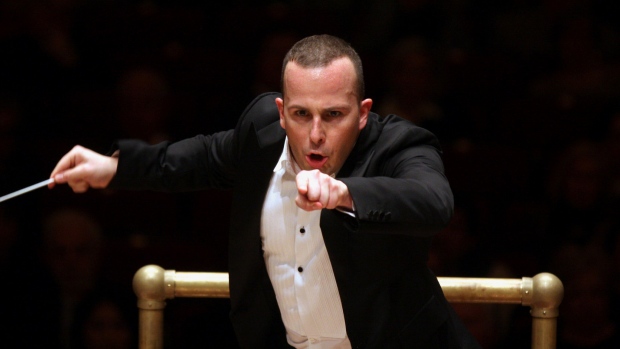Sumptuous Tchaikovsky and brooding Bartók ideally served by Nézet-Séguin, Philadelphia Orchestra

Yannick Nézet-Séguin conducted the Philadelphia Orchestra Tuesday night at Carnegie Hall.
Yannick Nézet-Séguin has a knack for eclectic programing. While he doesn’t often go in for the concert-around-a-theme trick, he doesn’t constrain himself to the traditional overture–concerto–symphony model, either.
The program that he and the Philadelphia Orchestra brought to Carnegie Hall on Tuesday could hardly have been a starker contrast, pitting selections from Swan Lake, Tchaikovsky’s sumptuously gorgeous ballet, against Bartók’s brooding masterpiece Bluebeard’s Castle. The results could hardly have been more successful, either, as these musicians gave brilliant performances of both in what turned out to be an invigoratingly idiosyncratic program.
That Philadelphia and Nézet-Séguin should do well with Tchaikovsky is no surprise—their rich sound and liquid warmth, and his uninhibited style of music-making, are ideally suited to sweeping Russian romanticism, and these qualities were evident right from the start, with the opening scene of Act II. They gave a vivid realization of Act III’s ball scene, from the grand, floating waltz to the sensuous charm of the “Spanish Dance,” through the gypsy fire of the “Russian Dance,” where concertmaster David Kim played with sultry flair.
The final selections were from Act IV, beginning with the beguilingly sweet “Dance of the Little Swans,” moving through the wailing winds and turmoil of the storm, and finally breaking through into a massive, climactic resolution. Nézet-Séguin conducted almost without pause, giving the feel of a well-balanced suite rather than an assemblage of diffuse selections.
And then, something completely different. Where Swan Lake is an overflowing expression of Romantic passion, Bluebeard’s Castle is a psychologically disturbing drama, the unease of which is reflected in the dark shimmering of its score. For Nézet-Séguin, music director–elect of the Metropolitan Opera, this was something of a departure from the operatic fare he’s led in New York before, having so far conducted Carmen, Don Carlo, and Rusalka at the Met. His Bluebeard was not the most precise rendition, but he showed keen understanding of an enormously complex work, and delivered a powerful interpretation.
In this hour-long drama for two, Duke Bluebeard, a mysterious man with a dark secret, has led a young woman to his castle to become his new bride. In spite of his repeated warnings, her curiosity drives her to demand that he open in turn all seven of the doors to a series of secret rooms, discovering behind the seventh the resting place of his previous three brides, trapped for all time with a space for her to join them.
Michelle DeYoung has a great deal of experience with this role, and brought to Tuesday’s performance a rich, focused sound and captivating portrayal—her Judith is no young naive, but a woman of seemingly pathological fearlessness and obsessive curiosity. She knows that her persistence will only lead her to ruin, but cannot be satisfied until she knows the entire truth, even when riches and power are promised on top of the love she desires. There is a forthright power in her voice that matches her characterization—bright but mature, this is not the sweet sound of an ingénue. Rather she projected a fierce confidence that is shaken only in the opera’s final moments, when it is too late to undo her mistake
Much of the meat seems to have come off of bass John Relyea’s voice over the years, leaving a lean, gravelly tone that might not work for Verdi but fits the imposing darkness of Bluebeard. Even in a staged performance, this is a difficult character to make complete sense of; Relyea’s characterization in this concert version was convincing, a man with a terrible past who earnestly wants to protect the new woman in his life, but is ultimately powerless to stop the curse that lies on him and his dominion. His voice was tinged with grief in later moments as he sensed he could no longer save Judith, and he even betrayed a hint of loving passion when singing paeans to his first three wives.
The orchestra’s playing was intensely dramatic throughout, in its swelling rushes of excitement, sudden calms, and moments of tremulous terror echoing Judith’s own state of mind as she encounters the wonders and horrors of Bluebeard’s cursed palace. One could hear the shimmering of Bluebeard’s hoard in the gleam of the brass and see vividly the vast reaches of his domain in the terrifying, majestic clamor after the opening of the fifth door.
Bluebeard is a powerfully strange work, wholly compelling yet nearly inscrutable. So many questions of its meaning linger—Is Judith the final piece in Bluebeard’s macabre collection? Will others suffer her fate? What, if any, moral are we to learn? As perplexing as it is rewarding, this is a piece that bears hearing and pondering again and again.


